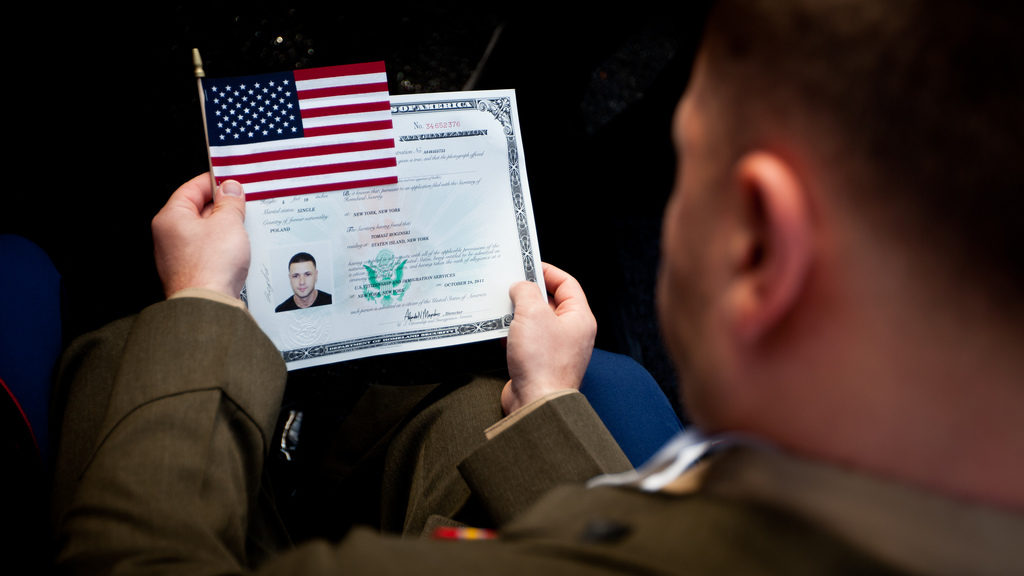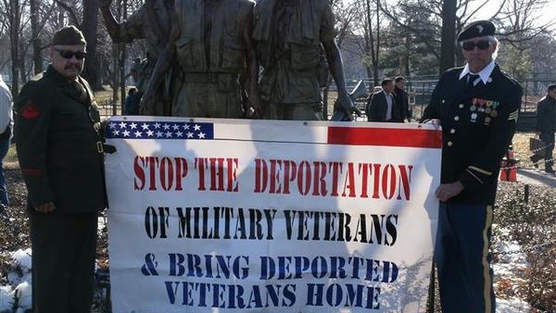
Immigration reform is not a zero-sum game.
Despite the delirious ranting from those opposed to all forms of immigration reform, fixing our dysfunctional immigration system is possible.
And it’s possible in a manner which benefits U.S. citizens, as well as legal residents.
To resolve our immigration concerns requires at least one consensus: allowing some immigrants to become lawful permanent residents.
Immigration Reform For Immigrant
Military Veterans
Like many immigration reform advocates, I would prefer to see comprehensive immigration reform legislation passed. Compassionate immigration reform.
Not proposals like S.744, the flawed Senate bill, floated last year.
But if compassionate and comprehensive reform is asking too much, I’m willing to support piecemeal solutions.
This approach requires immigration reformers to ponder and prioritize which immigrant subgroups are the most “politically safe” for Congress to support.
Because Senate and House representatives are not known for political courage, pinpointing which immigrants pose less electoral risk could fuel the passage of reform legislation.
However little, however late.
Since political delays can last seemingly forever, I’m willing to support measures that remove or minimize risks of deportation for immigrant subgroups – as well as create or improve paths to permanent residence and citizenship for them.
As a Riverside immigration lawyer, I have seen too, too many families destroyed by cruel immigration laws. In my view, to spare some immigrants such agony is to inspire hope for those not in the initial circles of immigration change.
Given Congress’ support for the armed forces, one place to start could be revamping removal policy toward immigrant military veterans. Based on their service, they deserve a special deportation waiver.
Unfortunately, few attempts have been made in Congress since this article was published, and none have been given serious discussion by a badly-divided House of Representatives and Senate.
In early 2019, a few bills have been sponsored again, in the hopes that maybe this time Congress will see fit to pass a waiver or related legislation for deported immigrant veterans.
The Cruel Irony Of Deporting Veterans
Until the anti-due process, anti-immigrant laws of 1996 are modified, if not eliminated, immigration reform will not be achieved – no matter what else is passed by Congress this year, or next, or later.
Under changes brought forth by IIRAIRA, new restrictions were imposed on defending immigrants who committed minor crimes, leading to the breakup of massive amounts of families, even those with deep family and community roots.
No immigrants, to date, have been spared.

For immigrants who have served time in the U.S. military ranks, in hopes of becoming U.S. citizens, the punishment carries an ugly irony.
The country, for which many were willing to sacrifice their lives to protect, has booted them from even again being able to live on U.S. soil.
Strangely, they can return when they are dead. All honorably discharged veterans, even immigrant deportees, are entitled to burial at a U.S. military cemetery with an engraved headstone and their casket draped with an American flag. The government even pays $300 toward the cost of bringing a deportee’s remains to the United States.
The actual count of exiled veterans is unknown. According to Banished Veterans, a group formed to help the deportees, thousands have been deported in recent years.
Supporters for immigrant military veterans argue they should be allowed some degree of special consideration. Punish them for their crimes, but do not deport them.
Even retired Air Force Gen. Richard B. Myers, who served as chairman of the Joint Chiefs of Staff under President George W. Bush from 2001 to 2005, has publicly acknowledged that deporting veterans “is not fair, and it’s not appropriate for who we are as a people.”
Expedited Citizenship, Not Expedited Deportation
Many immigrant veterans mistakenly believed that they automatically became a U.S. citizen upon joining the military.
Such beliefs are not far off course.
In actuality, under immigration law, an immigrant can apply for expedited naturalization while serving in the military.
During peacetime they can seek citizenship after three years of military service, rather than wait the usual five years after becoming a permanent resident. During declared periods of hostilities, they can naturalize immediately.
In the cases of many deported veterans, the process broke down due to bureaucratic errors.
Besides those who thought armed services naturalization was conferred automatically and did not check up on their status, others filled out paperwork which was never processed and lost in a paperwork black hole.
Had their applications been completed, as citizens, they would not be subjected to the harsh deportation consequences imposed on lawful green card holders.
General Myers points out the hypocrisy.
“To say to them, ‘You swore to support and defend the Constitution and put your life on the line for the rest of us. But you’re not a citizen. So too bad. You’re gone.’ I just think that’s not us.”
The Story Of Howard Bailey
Recently, the story of Howard Bailey was shared by David McFadden, writing for the Associated Press.
His article, A U.S. Veteran, Deported And Struggling In Jamaica, discussed how Bailey, who joined the U.S. Navy straight out of high school in Brooklyn figuring he would see the world and served in the Gulf War, now lives in Jamaica due to a 1997 drug-related conviction.
He followed the advice of his criminal attorney, apparently not versed in deportation law, and accepted a plea bargain. He served 15 months in custody, another immigration red flag not addressed by his defense counsel, and thought his punishment was over.
Such mistakes were not uncommon during the early days of IIRAIRA.
Several years later, Bailey applied for U.S. citizenship in 2005. This action, too, was ill advised.
Immigration authorities spotted his criminal history. He was later placed in an immigration detention center. In 2012 he was removed to his country of birth.
The consequences of IIRAIRA’s rigidity are reflected in Bailey’s own comments.
“It’s so hard,” Bailey said, gesturing at a few rough-hewn pigpens and yam vines climbing up bamboo sticks. “I went from owning a successful trucking business and two homes in the U.S., paying my taxes, raising two beautiful children with a beautiful wife to, well, what you see here.”
Of course, diehard immigration reform opponents dispute any special status for veterans like Bailey. In their view, military service should not be used to absolve anyone from the consequences of their actions.
As a naturalization attorney, I disagree.
Why Not A Waiver For Immigrant Veterans Facing Deportation?
More than 30,000 immigrants currently serve in the U. S. armed services. Another 12,000 serve in the Selected Reserves and 8,000 more in the Inactive National Guard and Individual Ready Reserves.
According to the Cato Institute, a non-profit public policy research foundation, over 20% of the Congressional Medals of Honor recipients are immigrants. They have served the United States during wars with heroism “beyond the call of duty.” Many of them lost their lives or were seriously injured.
For those who experience criminal problems after their terms of duty were completed, a special waiver should be provided which allows them to demonstrate rehabilitation for their offenses and to complete the citizenship process.
To date, the ordeal of deported veterans has received little, if any, attention in the Congressional debate over immigration reform.
Yet, from a policy perspective, if their military service should have led to U.S. citizenship, it should likewise count as a mitigating factor to be weighed against their wrongdoing.
By Carlos Batara, Immigration Law, Policy, And Politics




